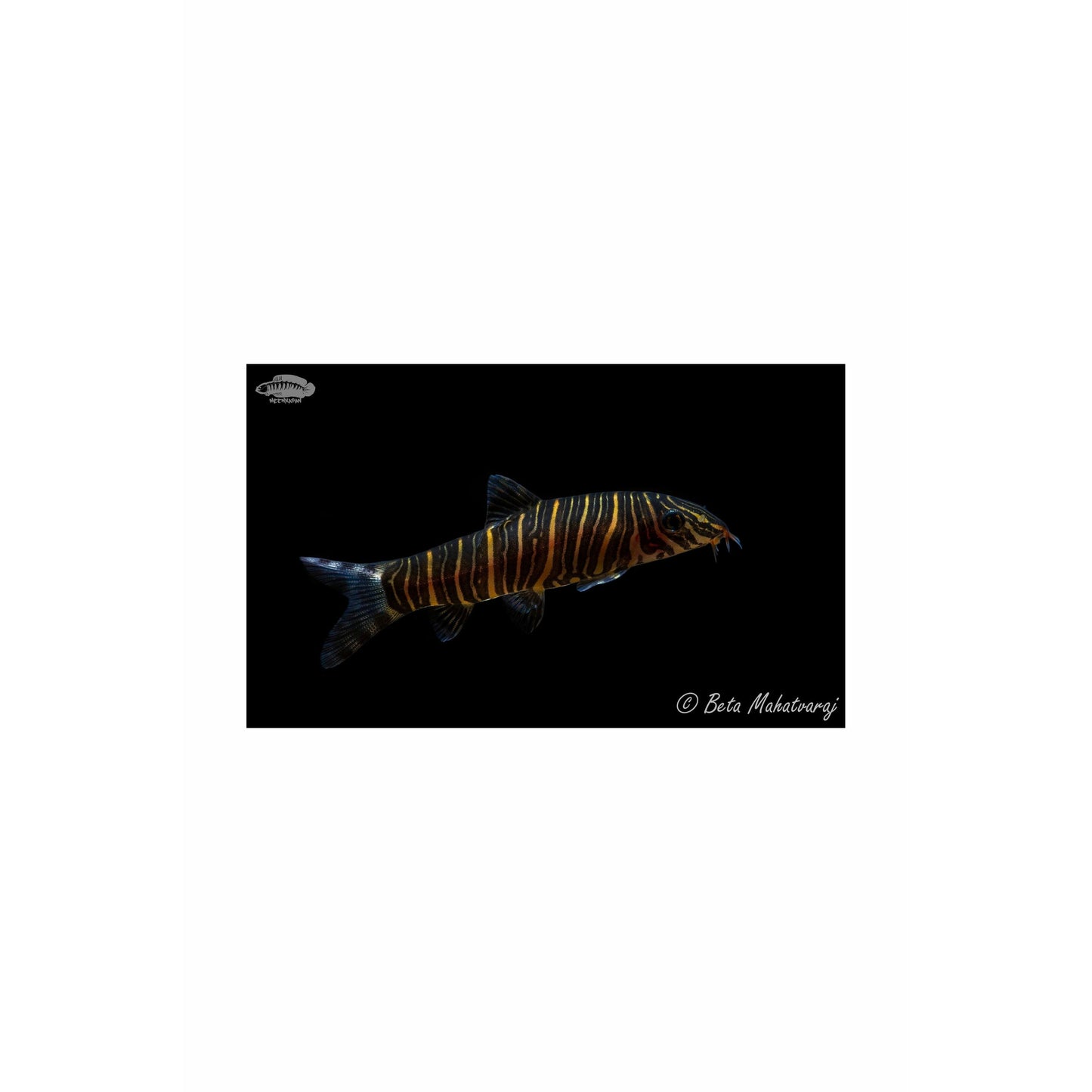- Product
- Zebra loach / botia striata
Zebra Loach / Botia striata
Couldn't load pickup availability
The Zebra Loach (Botia almorhae), also known as the Burmese or Silver Striped Loach, is native to India and throughout Myanmar. As a juvenile, this species looks somewhat similar to the Yo Yo Loach (Botia almorhae), but is a distinctly different species. It is a very active, inquisitive fish that is very gregarious in nature. As it matures, its black and gold coloration develops into a more complex, labyrinth-like pattern. It is compatible with many other fish and plants as well.
The Zebra Loach is an omnivorous species requiring a diet of meaty foods regularly supplemented with vegetable and fruit matter. It will often accept high quality dry foods, but its diet should also include regular offerings of live/frozen meaty foods of invertebrate origin. It also eats a fair amount of vegetable or fruit matter, so these items should be offered in sparing amounts on a regular basis. There are some reports that the Zebra Loach may occasionally eat soft leaf plants, so care should be taken to observe this fish when adding it to an aquarium with such plants. It is not known to bother more durable plants with heavier leaves, such as Anubias, Java Fern, Moneywort, and most mosses, among many other plants. In most cases, the Zebra Loach will not do significant damage to well-established plants in a larger aquarium as long as it is well-fed, including regular, but sparing vegetable and fruit matter in its diet.
The aquarium of the Zebra Loach should include plenty of plants, rockwork, and driftwood for it to explore. Plenty of cover is necessary for this species and will ensure the most activity and least stress. The Zebra Loach is an active species that also needs plenty of clear room in the aquarium for swimming and exploring. It exhibits a very sophisticated schooling behavior and social hierarchy where each individual species constantly strives to be the “leader of the school” by swimming to the front of the group. While this behavior may seem aggressive, it generally involves no real fighting and results in an exceptional level of activity. As long as the school includes at least 6-8 specimens, aggression or bullying within the school will be minimal or nonexistent. However, if the Zebra Loach is kept solitarily or in too small of a group, it can become withdrawn or aggressive. It will sometimes jump from the water, so a secure lid is necessary for its aquarium.
The Zebra Loach will thrive in an aquarium with very clean, well-maintained, high-oxygen water of moderate or high water flow and is generally peaceful with other species of fish, although its boisterous nature can be stressful to other very passive fish. It is an excellent tankmate for most rasboras, tetras, danios, livebearers, and other schooling fish that inhabit the middle and upper levels of the water column. In a spacious tank, it can also be kept with other bottom-dwelling fish that are not too timid or prone to be outcompeted at feeding time. The Zebra Loach, like most typical loaches, often preys on tiny shrimp and snails. This is very useful in helping reduce “pest snails,” but must also be considered with larger ornamental snails and shrimp. The Zebra Loach is a predator of many invertebrates.
What We Like About This Fish:
- Vivid black reticulated pattern over gold body coloration, especially as an adult
- Incredibly bold and active fish that almost never stops swimming and foraging
- Adaptable to a wide range of water parameters
- Very active in middle and lower levels of the aquarium
- Excellent candidate for many planted aquariums
RECOMMENDED TANK PARAMETERS:
- Temperature: 72° - 82.4° F (22° - 28° C). Care should be exercised to maintain high dissolved oxygen levels at the higher end of this temperature range.
- pH: 6.0 – 7.5
- KH: 2 - 10 dKH
- Minimum tank size: 75+ gallons for a group of adults
CARE GUIDELINES:
- Diet: Omnivore. Live and frozen meaty foods, especially frozen foods such as cyclops, Daphnia, Artemia, Tubifex, and bloodworms will all be readily accepted. High quality dry foods are also likely to be accepted. Some plant and fruit matter, such as cucumber, zucchini, blanched spinach, and melon should also be offered.




